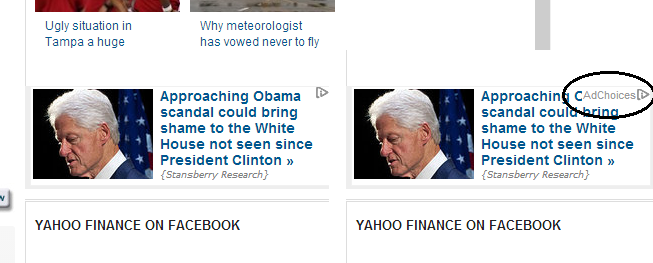aNewDomain.net — Is that story you read written by a journalist, a blogger or a marketer?
If it is written by a marketer it is native advertising.
The term and its sister term, “content marketing,” are huge buzzwords in advertising right now. And they’re more than buzzwords. The terms are what “big data” is to IT at this moment. Big data is on marketing radars, too.
But that’s the next story.
Definitions vary, but native advertising and content marketing are methods to mix advertising into the content people consume. Its success isn’t directly measured with how many conversions it creates, but how viral it becomes with tweets, shares, links, etc. It’s designed to be further removed from the hard sell, maybe not even mentioning the product at all because pushing the product with a hard pitch would make the reader feel fooled into clicking a disguised-banner ad. Instead the soft sell takes the reader to a page that has the company’s ads all over it, but not within the content.
For example, a blogger looking to write a story on texting and driving finds The 19 Most Ridiculous Texting Fails and works it into the story with a link. The content of this link is created by Virgin Atlantic’s marketing department, and the link is inserted into BuzzFeed’s website. BuzzFeed is a Virgin Atlantic Partner. Some of the texts are racy, and Virgin wouldn’t want to put its name to it. But on the page where the texts appear Virgin Atlantic has eight ads. The campaign is a success. The page has 65 comments, six thousand Facebook shares, 17 thousand likes and 642 tweets. People are seeing Virgin Atlantic ads sent by friends and colleagues.
Or if you watch MasterChef with Gordon Ramsey, chefs are challenged to make mouthwatering meals with Walmart steak, arguing that Walmart steaks are every bit as good as steak you would buy from the corner butcher. Does Ramsey really believe that? It doesn’t matter. Walmart inserted its advertising into the show as well as the surrounding commercials. Whether the steak is as good as if it came from the corner butcher isn’t nearly as important as finding a way around fast-forwarding through the commercial. The whole thing is a commercial. Some people will be disapointed at Ramsey for selling his name to Walmart, and others would think, Wow, Walmart has steak.
In the case of Virgin Atlantic, other than distracting us, the ad is harmless because it didn’t advertise itself as journalism. But there are stories that are disguised as journalism and written by marketing teams. The native advertising rate of use is increasing. Major online publications in the last year have partnered with native advertising providers. Publications like AP, The Washington Post, Mashable, and The Dallas Morning News all use this type of advertising.
The advertising industry is trying to define the line to indicate when an article is sponsored. Sometimes it can be impossible to tell, as in The Atlantic’s posting a story on the Church of Scientology. Apparently this story has become the bellwether of poor judgment for a publication to pass advertising off as journalism. The Atlantic has since gone to greater lengths to differentiate its native advertising from its non-sponsored content.
Then there are the more-obvious ads on the Yahoo home page that are somewhat incongruous to the other headlines. For example these three headlines are on my Yahoo news page:
NY Suing Wells Fargo in Mortgage Crisis Settlement
Markets Jittery on US Government Shutdown
By just reading the middle headline, I really don’t expect in-depth coverage on why razors are so expensive. And I’m not disappointed. In fact it links to dollarshaveclub.com and a self-launching irrelevant video crafted to go viral where the spokesman uses the F word, etc. That headline has replaced the banner ad at the top of the page that you don’t click on.
For those who are smart enough to know the first headline is a real story and the second story is an ad may not be as savvy when clicking on the first story. On the page,
NY Suing Wells Fargo in Mortgage Crisis Settlement, is the headline. On the other hand, the accompanying text that reads, “Approaching Obama Scandal could bring shame to the White House not seen since President Clinton (Stansberry Research),” is in Yahoo Financials. Not until you mouse over the content do you see the advertiser’s logo: AdChoices. Again you’re brought to a video that is promoting a financial product.
At its best — according to marketers — it’s a soft sell without an attempt for conversations, not immediate conversions. Its goal is to get people to talk about a product. The jewel in the crown is to have it go viral. Like the Virgin Atlantic ad. A well-crafted video, tweet blog or meme seen by millions because it got picked up in the vortex of all things social.
At its worst — again according to marketers — it is reworked marketing materials shoehorned into a disingenuous narrative. More are bad than good because advertisers are still finding the tools to do it right.
From a journalist’s view, it’s all bad. In fact the more effective it is, the worse it is because marketers are shaping the message instead of skeptical independent third parties.
But does that middle headline/advertisement on the Yahoo page — and there are more on the page — affect the quality of the other content on the page? The Wall Street Journal’s new editor Gerard Baker seems to thinks it does. Baker calls it a Faustian pact. As marketers erode the quality of content on venerable publications, they will drive away readers, making their ads less effective.
That’s partially why the industry is trying to define acceptable boundaries. And so is the U.S. government.
On December 4th, provided the government shutdown doesn’t upset its schedule, the FTC will host a workshop to “explore the blurring of digital ads with digital content.” The workshop will bring together publishing and advertising industry executives as well as consumer advocates, scholars and regulators.
For aNewDomain.net, I’m Dino Londis.
Based in New York, Dino Londis is a senior commentator at aNewDomain.net. He’s also an IT Pro alum at National Lampoon and teamBYTE. Email him at Dino@aNewDomain.net.













